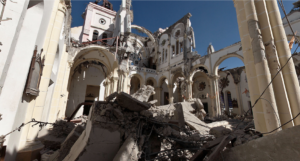PORT-AU-PRINCE, Haiti — The devastating earthquake that hit Haiti last month may have caused billions of dollars more in damage than initially estimated, according to a study released Tuesday by the Inter-American Development Bank.
The study, based on a statistical analysis of data from 2,000 natural disasters over 40 years, estimates that the cost could be $7.2 billion to $13.2 billion, based on a death toll of 200,000 to 250,000; earlier estimates had hovered around $5 billion.
The authors — Eduardo A. Cavallo, Andrew Powell and Oscar Becerra — said their early snapshot was “useful to put this event into perspective and to inform the international community of the enormity of the challenge that lies ahead in the task of reconstructing Haiti.”
But they underlined their caution about the exact figures, writing: “We cannot know if the experience with past episodes around the world will be relevant for Haiti. Every event is different, and although we control for country and regional specific characteristics in the regression, we could have missed something.”
A more comprehensive estimate of damages is under way by experts at the Inter-American bank, the World Bank and the United Nations Development Fund. But it is already clear, the development bank’s economists said, that the “sum will be beyond the scope of one agency or one bilateral donor” and require significant international cooperation to manage.
Established 60 years ago, the Inter-American Development Bank, based in Washington, has 48 members, including 26 Latin American and Caribbean countries. The United States is its strongest single member.
The authors note that Haiti’s economy is likely to be stunted by the earthquake for many years, citing an earlier study that shows that “even 10 years after a major disaster, the affected country growth may be some 30 percent below what growth would have been.”
In terms of rebuilding Haiti’s homes, schools, roads and other infrastructure, the study released Tuesday said, the cost is expected to be many times lower than that of Hurricane Katrina in 2005, a result of the far higher costs of property in the United States. Katrina’s price tag was put at more than $100 billion.
But in terms of Haiti’s economy coupled with the number of deaths per million inhabitants — Haiti’s population was at 8.7 million before the earthquake struck — the development bank’s study estimates Haiti’s quake is likely to be the most destructive natural disaster in modern times.
It caused five times more deaths per million inhabitants, the bank said, than the second-ranking natural killer, the 1972 earthquake in Nicaragua. The Haiti quake will be vastly more destructive that the Asian tsunami in 2004 and the cyclone that hit Myanmar in 2008.
The astronomical figures were difficult to fathom for Haiti’s traumatized residents, but they certainly agreed that the earthquake’s damage had been profound.
“All those buildings, the cars, the collapsed houses, a lot has been lost,” said Jean Philippe Dorzin, 32, interviewed on the edge of a vast squatter camp in Port-au-Prince’s Champ de Mars, where thousands of displaced people now live within sight of the damaged National Palace and other destroyed government buildings. “One thing we’ll never recover is all the people we’ve lost. You can’t put a price on them.”
